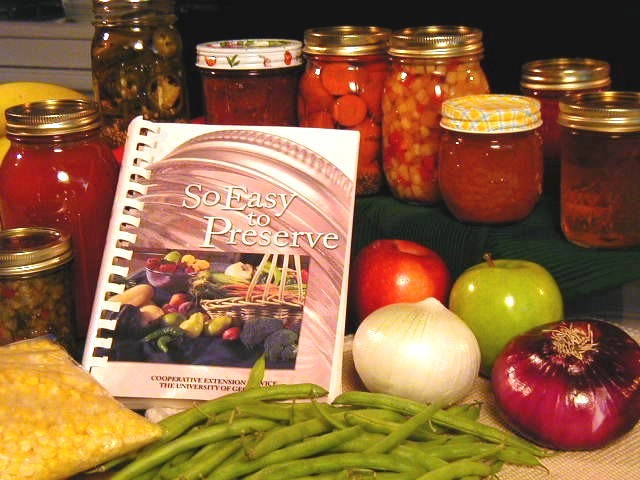Family & Consumer Sciences
Serving Safe Food
ServSafe Restaurant Manager Training Description
You can improve your food safety and sanitation skills through a nationally recognized food safety sanitation course. The class is 12 hours + exam by a Certified ServSafe Trainer of UGA Family and Consumer Sciences.
This course meets the new GA Food Code requirements and is certified through the National Restaurant Association and includes the course book, supplies, educational materials, exam, instruction, and refreshments. Successful completion of the exam provides certification.
The class fee of $150.00 includes course book, supplies, educational materials, exam, instructions, and refreshments. Lunch is on your own. Call for next dates that class will be offered (229) 436-7216.
So Easy to Preserve
The links below are a small example of what this wonderful book provides...
Uncooked Jams & Jellies
Drying Fruits & Vegetables
Freezing Vegetables
Freezing Animal Products
Freezing Prepared Foods
What if the freezer stops
Sensational Salsas
Flavored Vinegars
Diabetes-
Eating Guidelines
Improving Control with Carb Counting
Revitalize Your Recipes
Eating Out with Diabetes
Cooking with Diabetes
Meal Planning & Shopping with Diabetes
Dealing with the Holidays
Diabetic Recipes
Diabetic Foot & Skin Care
Fighting Diabetic Complications
Getting Active with Diabetes
Exercising with Diabetes
Upcoming Events
-
Feb 24 ServSafe Food Handler Course and Exam Grow your skills and confidence in the kitchen! Receive your ServSafe Food Handler Certificate after successfully taking this class and passing the exam. Perfect for restaurant employees and anyone interested in their own Cottage Foods Business.
- Albany, GA
-
Apr 27 ServSafe Manager Two-Day Training Georgia Cooperative Extension provides the nationally recognized and accredited ServSafe® training for foodservice managers from the National Restaurant Association Educational Foundation (NRAEF). Upon successful completion of the ServSafe® examination, the ServSafe® Food Protection Manager certificate will be issued by the NRAEF.
- Albany, GA
-
Apr 28 ServSafe Manager Two-Day Training Georgia Cooperative Extension provides the nationally recognized and accredited ServSafe® training for foodservice managers from the National Restaurant Association Educational Foundation (NRAEF). Upon successful completion of the ServSafe® examination, the ServSafe® Food Protection Manager certificate will be issued by the NRAEF.
- Albany, GA
-
Jul 21 ServSafe Manager Two-Day Training Georgia Cooperative Extension provides the nationally recognized and accredited ServSafe® training for foodservice managers from the National Restaurant Association Educational Foundation (NRAEF). Upon successful completion of the ServSafe® examination, the ServSafe® Food Protection Manager certificate will be issued by the NRAEF.
- Albany, GA
-
Jul 22 ServSafe Manager Two-Day Training Georgia Cooperative Extension provides the nationally recognized and accredited ServSafe® training for foodservice managers from the National Restaurant Association Educational Foundation (NRAEF). Upon successful completion of the ServSafe® examination, the ServSafe® Food Protection Manager certificate will be issued by the NRAEF.
- Albany, GA
-
Oct 20 ServSafe Manager Two-Day Training Georgia Cooperative Extension provides the nationally recognized and accredited ServSafe® training for foodservice managers from the National Restaurant Association Educational Foundation (NRAEF). Upon successful completion of the ServSafe® examination, the ServSafe® Food Protection Manager certificate will be issued by the NRAEF.
- Albany, GA
-
Oct 21 ServSafe Manager Two-Day Training Georgia Cooperative Extension provides the nationally recognized and accredited ServSafe® training for foodservice managers from the National Restaurant Association Educational Foundation (NRAEF). Upon successful completion of the ServSafe® examination, the ServSafe® Food Protection Manager certificate will be issued by the NRAEF.
- Albany, GA

